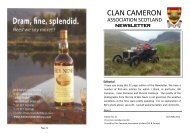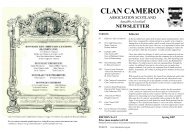spring08 2 - The Clan Cameron Association Scotland.
spring08 2 - The Clan Cameron Association Scotland.
spring08 2 - The Clan Cameron Association Scotland.
You also want an ePaper? Increase the reach of your titles
YUMPU automatically turns print PDFs into web optimized ePapers that Google loves.
<strong>The</strong> Midmar Tug o’ War<br />
Contributed by Duncan <strong>Cameron</strong>, Vice President NE & Highland<br />
This article is based on a longer article which first appeared in the Leopard Magazine and was written<br />
by John Duff and is published with their permission. It relates to an earlier article which we published,<br />
contributed by Douglas <strong>Cameron</strong>, Kintore and his family’s abilities at heavy weight competitions. <strong>The</strong><br />
main character from our point of view is Alexander <strong>Cameron</strong>, the anchorman who was Douglas’s<br />
grandfather and Duncan’s Great-Grandfather. <strong>The</strong> story is about a famous tug o’ war match in 1910.<br />
Tug o’ war is still very much a feature of the games in the North-East circuit. (Editor)<br />
It all originated in the sports or games which were held in so many districts prior to the<br />
Great War. At that time there were games at Tillycairn, Burnhervie, Monymusk,<br />
Kemnay, Dunecht, Echt, (where the Show still flourishes), as well as Midmar, where<br />
the games in 1910 may have been a one-off rather than an annual event. Country areas<br />
were much more homogenous in character then than they are now, and the large<br />
numbers of young, strong and active men working on the various estates and farms<br />
ensured that inter-parochial rivalries<br />
were both intense and sustained. <strong>The</strong><br />
competition in the various events, and<br />
especially the tug-o-war, a parish as<br />
opposed to an individual contest, was<br />
without real malice, but otherwise ruthless,<br />
with no quarter being given or<br />
expected. To win was the aim, and let<br />
the devil take the hindmost!<br />
<strong>The</strong> successful Cluny tug o’ war team with<br />
Alexander <strong>Cameron</strong> in the centre of the front row<br />
with the black cap<br />
<strong>The</strong> captain and coach of the Midmar<br />
tug team was John Mchardy the Corsindae<br />
gamekeeper. It is not known<br />
whether he himself pulled, but his surname<br />
indicates possible descent from a<br />
Braemar family of heavy athletes with a<br />
record second to none, so he may well have done. At any rate, he was clearly<br />
something of a showman, and a prominent Midmar 'character'. His team was at daggers<br />
drawn, and in competition for the regional top-dog position, with the neighbouring Cluny<br />
team, captained by Robbie Moir, the Cluny blacksmith, and, coached by wee Jockie<br />
Raitt, the local threshing contractor. Both were obviously first class teams.<br />
Burnett as the anchor, Dod Chalmers who farmed at Bankhead, and George McDonald,<br />
at 20, who was the 'loon' of the team. He worked at Cluny estate sawmill, but later<br />
became sawmiller at Kinsteary estate, and was coach to the famous Auldearn tug team<br />
of the 1950s. He lived to be 91. George McAllan worked at the Upper Tillenhilt sawmill.<br />
John Anderson came from Kintocher, Craigievar, and was engineman to Davie Angus,<br />
the Midmar contractor, and later foreman at Bethlin. Andrew Strachan left Midmar to<br />
become sawmiller at Kinsteary for Lady Gordon Cathcart, but died of a heart attack, and<br />
finally William Christie, who farmed at North Bandodler.<br />
At last, the great day came and the pulls started. As expected, Echt and Torphins were<br />
eliminated in the preliminary rounds, and the field was left to Cluny and Midmar. It was<br />
soon all over, with John McHardy's dreams of 'World Championship' in ruins, and Cluny<br />
victorious. Now it was Robbie Moir's turn to crow, and he had his victorious team<br />
photographed outside his house at Vulcan Croft, along with G. Milne Mitchell, the Cluny<br />
poet, whose acid wit was apparently equally respected and feared by his neighbours, and<br />
who had produced verses commemorating the great victory. Cluny's triumph was rendered<br />
all the sweeter by two American Directors of Sport on a study trip to <strong>Scotland</strong>,<br />
who, hearing of the contest, visited Cluny to learn from the masters. <strong>The</strong>y were included<br />
in the photo, complete with Norfolk jackets and long shorts.<br />
<strong>The</strong> Cluny team members included Willie Moir, from the School Croft,who looked after<br />
the gas plant at Cluny Castle, but died young, his lungs damaged by the gas. Alex<br />
<strong>Cameron</strong>, a big Highlander, was the local joiner, and his reason for settling in Cluny is a<br />
mystery 1 . He was the Cluny anchorman, but was dismissive of his importance. "Och,<br />
they didn't need me at all," he would say after a victory. Jockie Raitt, the coach, was as<br />
stated, a threshing contractor, and had some sort of a device on his traction engine which<br />
seemed to chant, "Jockie Raitt, Jockie Raitt", as it was driven along the road. Geordie<br />
Leiper remembers how the engine had a shrill whistle, and how the farm lads used to<br />
speak of someone "pulling the rat's tail" when they heard it. Jockie's winning formula as<br />
coach was to try to gain a yard or so, then get his team to 'hold', while he edged over to<br />
watch the opposition, hands behind his back. As soon as he saw some sign of inattention<br />
by his opponents, he would give a hidden hand signal to his team to give a sudden heave<br />
which very often resulted in a runaway victory.<br />
Also connected with the team, but apparently not at that stage pulling members, were<br />
Robert Chivas, the farmer from Nether Inver, Monymusk, and Robert Durward the<br />
Dunecht souter. Apart from specialising in making indestructible tackety boots, Bob<br />
It seems that at some stage prior to the great 1910 tug, the Midmar team had beaten Cluny, Durward bred prize-winning Brown Leghorn poultry, and was determined to keep his<br />
but 'young' Rob Moir states darkly that this was only after the Cluny team had been given success to himself: if someone badgered him for a setting of eggs, and he felt he could<br />
drink by someone unknown! At any rate, both teams had something to prove, and a not refuse, he took the precaution of boiling them before handing them over!<br />
confident John McHardy, in advertising the Midmar Games, had billed the tug contest as<br />
a World Championship, thus raising the stakes considerably. Finally, four teams were left <strong>The</strong>re was a sequel to the Cluny team's successes. During the Great War, Canadian<br />
to decide the championship among themselves - Cluny, Echt, Midmar and Torphins. lumberjacks came to Kemnay to fell timber for the war effort, and thought that they<br />
McHardy had his team photographed, with himself sporting six medals that the team would challenge Robbie's team. Having seen them, however, the Canadians changed<br />
presumably had won, although again Rob, unconvinced, growls that medals can easily be their minds.<br />
bought.<br />
1 Alex <strong>Cameron</strong> came from Kilmonivaig to build the schoolhouse.<br />
<strong>The</strong> Midmar team comprised David Robertson, J. Hay and John Hendry, with big Jim<br />
P. 6 P. 7




